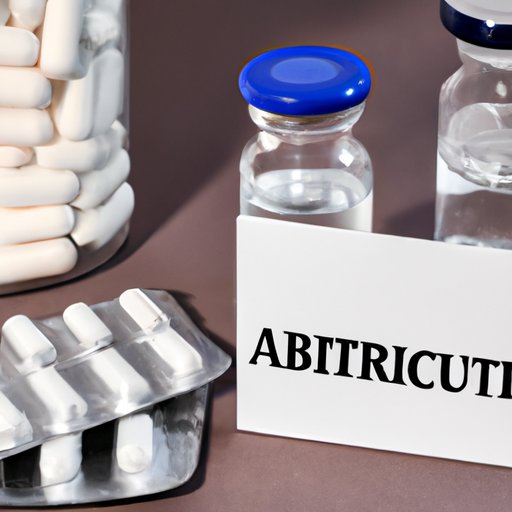
Introduction
Antibiotics are known for their effectiveness against bacterial infections, but they can also disrupt our gut health by killing off both good and bad bacteria. The overuse of antibiotics has led to a rise in antibiotic-resistant bacteria and an increased need to protect our gut microbiome. Probiotics have been shown to promote and maintain gut health, but can they be taken with antibiotics? In this article, we will explore the benefits and best practices of taking probiotics with antibiotics to maximize their effectiveness and protect our gut health.
How to Protect Your Gut Health while taking Antibiotics: The Role of Probiotics
Antibiotics work by killing bacteria, but they can’t distinguish between the good and bad bacteria in our bodies. This can lead to a disruption of our gut microbiome, causing symptoms such as diarrhea, indigestion, and inflammation. Probiotics are live microorganisms that can help restore and maintain gut health by replenishing the good bacteria that antibiotics can eliminate. Probiotics can be found in foods like yogurt and kefir, as well as in supplement form.
Studies have shown that taking probiotics during antibiotic therapy can decrease the risk of antibiotic-associated diarrhea and other gut-related side effects by up to 42%. This is because probiotics can help balance the bacterial composition of our gut, promoting better digestion and absorption of nutrients.
The Do’s and Don’ts of Taking Probiotics with Antibiotics
While taking probiotics with antibiotics can be beneficial, there are some factors that can affect their effectiveness. For example, the timing of probiotic consumption can have a significant impact on their ability to survive in the gut. Many experts recommend taking probiotics at least two hours before or after antibiotic intake to avoid any interference with their effectiveness.
It’s also important to choose the right type of probiotic. Not all probiotics are created equal, and different strains have different effects on the gut microbiome. For example, Lactobacillus and Bifidobacterium are two strains that have been shown to be effective in promoting gut health during antibiotic therapy.
Probiotics and Antibiotics: Can They Co-Exist within Your System?
While it is generally safe to take probiotics with antibiotics, the two can have differing effects on the gut bacteria. Antibiotics can decrease the number of good bacteria in our gut, while probiotics can increase it. This is why it’s important to take probiotics during and after antibiotic therapy to help replenish the gut microbiome.
The type of antibiotic you are taking can also impact the effectiveness of probiotics. For example, broad-spectrum antibiotics like amoxicillin and tetracycline can impact a wider range of bacteria, including the good bacteria that probiotics are meant to supplement. This means that taking a broad-spectrum antibiotic may require a higher dose and a more specific type of probiotic to be effective.
It’s also important to note that certain medications can interact with probiotics, including some immunosuppressants and antifungal drugs. If you are taking any other medications, be sure to consult with your healthcare provider before starting a probiotic supplement.
Maximizing Your Antibiotic Therapy: The Benefits of Taking Probiotics
Research has shown that taking probiotics with antibiotics can enhance their efficacy, leading to a faster recovery time and decreased risk of recurrence. Probiotics can also help prevent the overgrowth of harmful bacteria, which can lead to secondary infections and complications.
One study found that taking a specific strain of probiotic during antibiotic therapy reduced the risk of Clostridium difficile infection by 64%. C. difficile is a type of bacteria that can cause severe diarrhea and other intestinal problems, and is often associated with antibiotic use.
Managing Gut Disruption During Antibiotic Intake: Incorporating Probiotics into Your Medication Regimen
Integrating probiotics into your medication regimen can be easy if you follow some simple steps. First, choose a high-quality probiotic supplement that contains the strains recommended for gut health during antibiotic therapy. Be sure to take the supplement at least two hours before or after antibiotic intake to avoid interference.
You can also incorporate probiotics into your diet by eating fermented foods like sauerkraut, kimchi, and kefir. These foods naturally contain high levels of probiotics and can be a tasty addition to your meals. Another option is to try probiotic drinks and shots, which can be found at most health food stores.
Finally, it’s important to continue taking probiotics even after you have finished your antibiotic therapy. This will help restore any good bacteria that may have been lost and maintain gut health in the long term.
Conclusion
Antibiotics can have a significant impact on our gut health, but taking probiotics with antibiotics can help protect and promote gut health during and after antibiotic therapy. Be sure to choose the right type of probiotic, consume it at the right time, and continue taking it after antibiotic therapy to maximize its benefits. Consult with your healthcare provider if you have any concerns or questions about taking probiotics with antibiotics.




